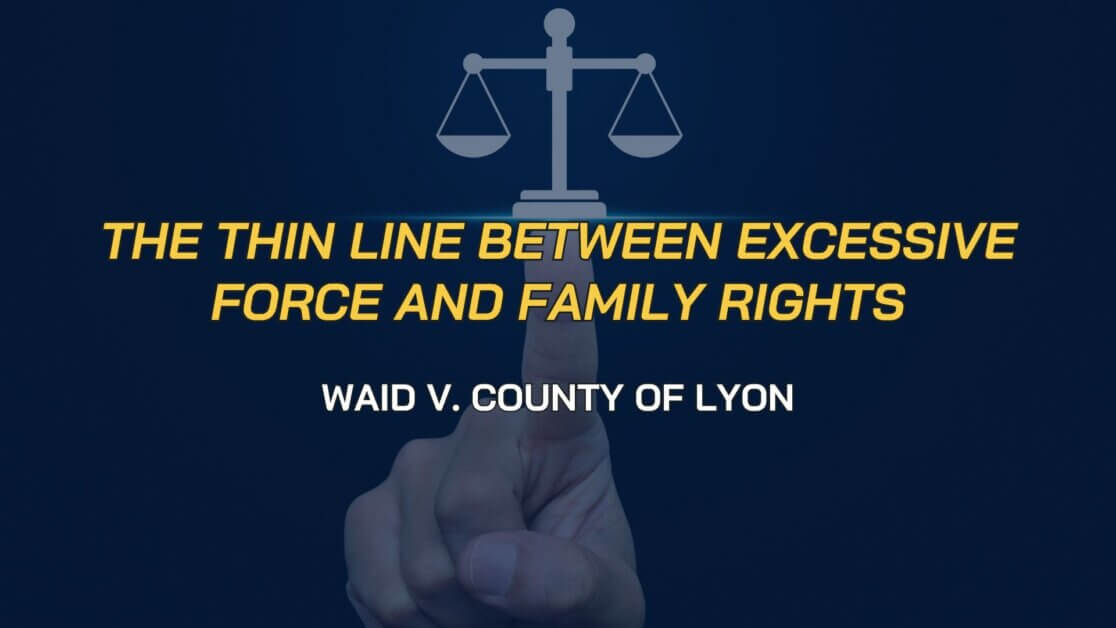Browning v. Edmonson County, 2021 U.S. App. LEXIS 34090 (6th Cir. KY Nov. 17, 2021)
Today’s case from the Sixth Circuit involves a high-speed car chase, a potentially armed suspect, and use of force. This case highlights some terminology that I would like to discuss: discretionary acts or ministerial duties.
These terms come into play when minors are present during an event. Our case today was further complicated by the fact that the deputy who began the high-speed pursuit saw that there were minors in the car.
In the court system, “[a] duty is discretionary if the government actor is required to exercise his or her judgment or discretion in performing the duty.” On the other hand, “a duty is ministerial and not discretionary if it is imposed by law and its performance is not dependent on the employee’s judgment.”
When it comes to qualified immunity this becomes a little tricky, because qualified immunity is dependent on an officer making their own judgement, not just obeying orders. In our case today, for example, our deputy would not be entitled to qualified immunity if his conduct is considered a ministerial act which “requires only obedience to orders of others, or when the officer’s duty is absolute, certain, and imperative, involving mere execution of a specific fact.” Conversely, a discretionary act entails “the exercise of discretion and judgment, or personal deliberation, decision and judgment.”
Let’s examine this a little bit further by looking at what happened on the night of February 27, 2018.
FACTS
Deputy Austin Meredith of the Edmonson County Sheriff’s Office (“ECSO”) attempted to initiate a traffic stop due to an unilluminated license plate and the failure of a passenger to wear a seatbelt. The automobile was being driven by Brandon Embry, with plaintiffs M.S. and C.S., who were minors, sitting as passengers in the vehicle. After following Embry for a short distance, Deputy Meredith activated his police cruiser lights and attempted to stop the vehicle. Instead of stopping, Embry immediately accelerated and attempted to flee. Deputy Meredith accelerated to follow and was soon joined in the pursuit by Deputy Jordan Jones, an ECSO Deputy Sheriff. Deputy Jones took over the pursuit, which lasted approximately 12 minutes over an 18-mile stretch of highway, with the vehicles reaching speeds of almost 130 miles-per-hour.
During the pursuit, Deputy Jones learned that the initiating offense was an unilluminated license plate, that there were multiple passengers in the vehicle, and that at least one passenger was believed to be unbelted. In addition, Deputy Jones saw objects being thrown out of the vehicle. Approximately two minutes before the pursuit ended, another officer radioed that he had found ammunition in the area where the objects had been thrown from Embry’s vehicle.
The pursuit ended when Embry’s vehicle crashed into another vehicle at an intersection. After the collision, Deputy Jones exited his vehicle, pulled his gun out, pointed the gun at Embry, and ordered him to get out of the vehicle. After Deputy Jones handcuffed Embry, he saw an individual, later identified as C.S., slumped over “kind of rocking back-and-forth.” Deputy Jones noted that his observation of C.S. “rocking back-and-forth could have been due to the vehicle itself rocking back-and-forth as it was coming to a rest.” At this point, Deputy Jones ordered C.S. to show his hands multiple times without receiving a response. Deputy Jones then tased C.S. because of the information he had received about ammunition being in the car and C.S. not showing his hands after multiple orders to do so. C.S. was eventually removed from the vehicle and airlifted to a hospital to receive treatment for his injuries. C.S. did not remember anything after the crash because he believed that he lost consciousness and did not regain consciousness until he was lying face down on the ground and handcuffed.
The plaintiffs, C.S. and M.S., filed a lawsuit against Edmonson County, Deputies Jones and Meredith, and Sheriff Shane Doyle for, among other things, the decision to initiate and continue the pursuit of Embry’s vehicle and for excessive use of force for tasing C.S. while he was allegedly unconscious in the back of Embry’s vehicle. Deputy Jones and Sheriff Doyle appealed the district court’s denial of their motion for summary judgment based upon qualified immunity.
SIXTH CIRCUIT COURT OPINION
The Sixth Circuit Court of Appeals agreed with the district court and held that Deputy Jones was not entitled to qualified immunity on C.S.’s excessive use of force claim. After a severe collision following a car chase, C.S was not using verbal hostility, nor was he threatening the deputy or using any physical resistance. While Deputy Jones might have had a suspicion that C.S. was armed, it cannot be said that C.S.’s rocking back-and-forth was verbal hostility or physical resistance. In addition, it was not disputed that C.S. was found slumped over in the backseat following the collision. The court added that at the time of the incident it was clearly established that C.S. had a constitutional right not be tased where he showed no resistance other than a passive failure to respond to an order to show his hands, and where an obvious reason not to respond was the shock of the collision.
The court held that Deputy Jones was entitled to qualified immunity for his decision to initiate and continue the pursuit of Embry’s vehicle. The court recognized that for Deputy Jones to be entitled to qualified immunity on this claim, his conduct must have been:
- A discretionary act or function;
- Performed in good faith; and
- Within the scope of his authority.
Only the first prong, whether Deputy Jones’s conduct was discretionary or ministerial, was at issue in this case. The court recognized that to determine whether Deputy Jones’s act of initiating and continuing the pursuit was a discretionary act or a ministerial duty, it was necessary to examine ECSO department policy (the policy) regarding pursuits and emergency response driving.
The court concluded that the policy showed that Deputy Jones’s actions were discretionary in nature. Specifically, the policy provided that the “decision to initiate pursuit…will be discretionary with each individual officer” and “[t]he officer will use his discretion and terminate the pursuit…” The court noted that the policy is not strict in nature when it comes to when a pursuit must be initiated or when an officer must discontinue pursuit. The policy simply laid out factors for the officer to consider when making that decision based on the circumstances. Consequently, because Deputy Jones’s decision to continue the pursuit was a discretionary act, he was entitled to qualified immunity on the plaintiffs’ claims concerning his decision to continue the pursuit of Embry.
Finally, the court held that Sheriff Doyle was entitled to qualified immunity on the plaintiffs’ claims that he negligently allowed Deputies Jones and Meredith to continue pursuing Embry’s vehicle and for not enforcing the ECSO pursuit policy. The court found that Sheriff Doyle’s conduct of loosely supervising Deputy Jones and other officers during the pursuit was discretionary in nature. The court added that “Kentucky courts have repeatedly held that supervising employees is a discretionary function subject to the defense of qualified official immunity.”
TAKEAWAYS
A couple of key takeaways from this case: the dissenting circuit judge felt that the court was wrong in not granting Jones qualified immunity in the tasing of C.S. because he felt that any officer that thinks that a suspect may be armed should have the right to use force to protect his or herself. In the full argument from the court, however, several other cases are referenced, most notably Cockrell v. City of Cincinnati, because this case further proved and summarized that tasing is excessive force when a plaintiff has done nothing to resist arrest or is already detained. In many cases a § 1983 excessive-force claim is available, because of “the right to be free from physical force when one is not resisting the police is a clearly established right.”
Another key takeaway here is of course the discretionary versus ministerial distinction solely based off of ECSO policy. In other cases, Kentucky courts have held that the decision to initiate, continue, or terminate a pursuit was ministerial. However, those cases are different from this one because the departmental pursuit policies at issue in those cases were much stricter and granted far less discretion than the ECSO policy. Officers in those cases violated the ministerial portions of their respective pursuit policies and were not entitled to qualified immunity because of it. So, the bottom line is, know your policies!
Learn more about Use of Force issues this November at the Use of Force Summit 2022, live at Mohegan Sun.



